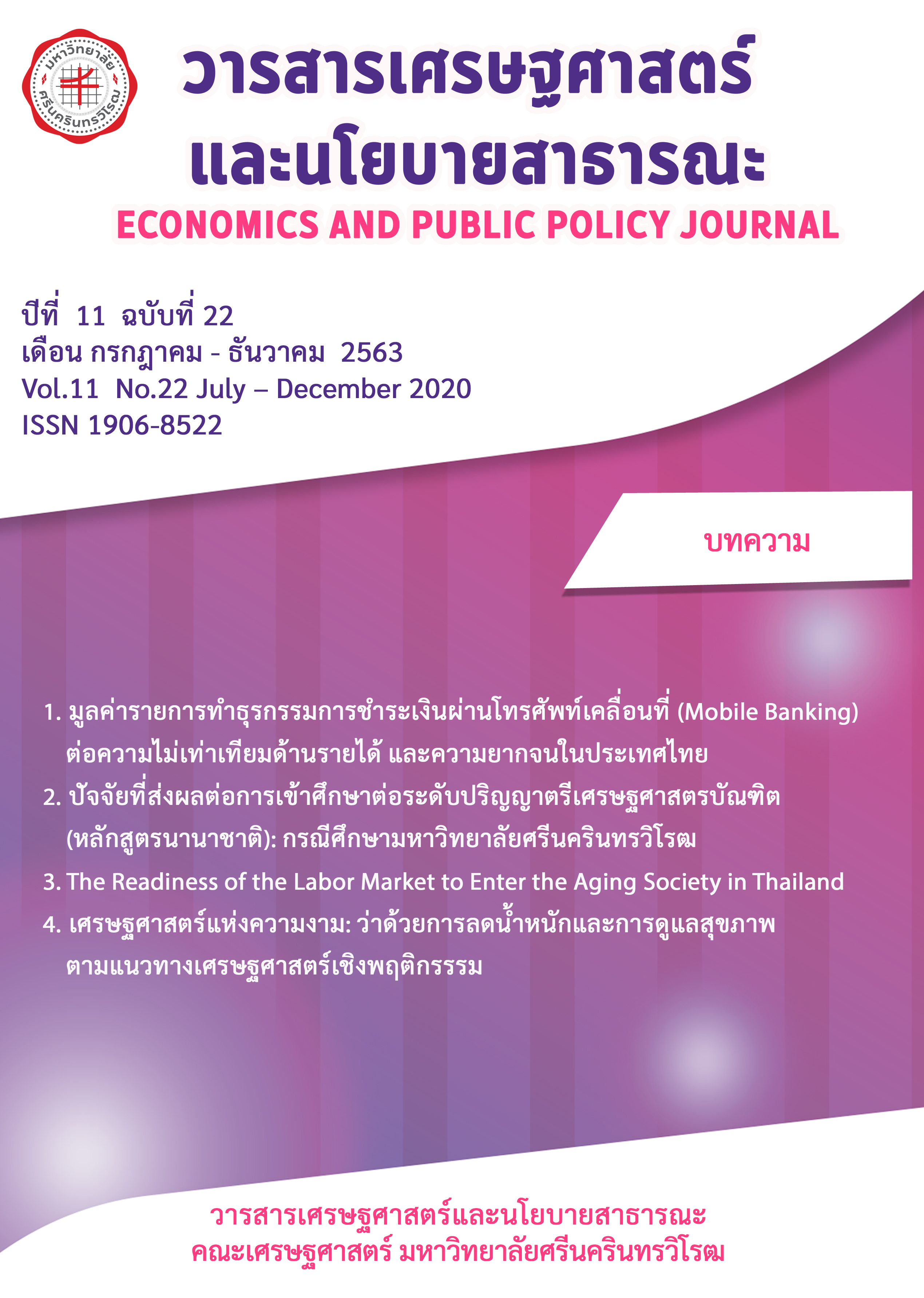Value of mobile banking payments on income inequality and poverty in Thailand
Abstract
บทคัดย่อ การศึกษานี้มีวัตถุประสงค์เพื่อศึกษามูลค่ารายการทำธุรกรรมการชำระเงินผ่านโทรศัพท์เคลื่อนที่ (Mobile Banking) ต่อความไม่เท่าเทียมด้านรายได้ และความยากจนในประเทศไทย โดยใช้ข้อมูลทุติยภูมิ (Secondary Data) เป็นรายไตรมาส สำหรับตัวแปรความไม่เท่าเทียม และความยากจน ถูกวัดผ่านค่าสัมประสิทธิ์ความไม่เสมอภาค (Gini Coefficient) และสัดส่วนคนจนด้านรายจ่ายเพื่อการอุปโภคบริโภค ขณะที่การวิเคราะห์ใช้แบบจำลองการถดถอยเชิงพหุคูณ ( Multiple Regression Analysis) โดยประมาณค่าด้วยวิธีการกำลังสองน้อยที่สุด(Ordinary Least Square: OLS) ผลการศึกษาหลักพบว่าการเพิ่มขึ้นของมูลค่ารายการทำธุรกรรมการชำระเงินผ่านโทรศัพท์เคลื่อนที่ (Mobile Banking) ช่วยลดความไม่เท่าเทียมด้านรายได้ ในขณะที่การเพิ่มขึ้นของมูลค่ารายการทำธุรกรรมการชำระเงินผ่านโทรศัพท์เคลื่อนที่ (Mobile Banking) ไม่ส่งผลต่อความยากจน สำหรับตัวแปรอื่น ๆ การเพิ่มของดัชนีการพัฒนามนุษย์ เสถียรภาพของรัฐบาล งบประมาณใช้จ่ายด้านการศึกษาของรัฐบาล และสินเชื่อที่ธนาคารให้แก่ภาคเอกชน ส่งผลให้ความไม่เท่าเทียมลดลงเช่นเดียวกัน โดยเฉพาะการเพิ่มขึ้นของการลงทุนสุทธิจากต่างประเทศส่งผลให้ความไม่เท่าเทียม และความยากจนลดลงอย่างมีนัยสำคัญ จากผลการศึกษาแสดงให้เห็นว่าการเพิ่มขึ้นของมูลค่ารายการทำธุรกรรมการชำระเงินผ่านโทรศัพท์เคลื่อนที่ (Mobile Banking) มีส่วนช่วยในการลดความไม่เท่าเทียมด้านรายได้ แต่ทั้งนี้พบว่าไม่สามารถลดความยากจนได้ เนื่องจากอาจมีข้อจำกัดที่ทำให้กลุ่มคนจนไม่สามารถเข้าถึงบริการทางการเงิน ดังนั้นเพื่อให้การเข้าถึงบริการทางการเงินมีประสิทธิภาพ และครอบคลุม แผนพัฒนาระบบการชำระเงินระยะต่อไปจึงควรคำนึงถึงกลุ่มคนจนมากยิ่งขึ้นคำสำคัญ : มูลค่ารายการทำธุรกรรมการชำระเงินผ่านโทรศัพท์เคลื่อนที่ (Mobile Banking), ความไม่เท่าเทียมด้านรายได้,ความยากจน,การเข้าถึงบริการทางการเงินABSTRACT This study aims to study the value of mobile banking transactions on income inequality and poverty in Thailand. By using secondary data on a quarterly basis. The income inequality and poverty variable were measured through the Gini coefficient and the proportion of the poor in their consumption expenditures. Multiple regression analysis was used with a method of ordinary least square (OLS). Main result found that the increased value of mobile banking transactions reduced income inequality, but it had no effect on poverty. Other variables increase, the human development index, government stability, government spending on education and domestic credit to private sector by banks resulted in the decrease of inequality. In addition, the increase in net flows of foreign direct investment resulted in the decrease of inequality and poverty significantly. The results of the study showed that an increase in the value of mobile banking transactions contributed to the reduction of income inequality. However, it couldn’t reduce the poverty since there were limitations which prevented poor people from having access to financial services. Therefore, in order to provide efficient and comprehensive access to financial services in the next phase of payment system development plans, the poor should be taken into account even more. Keyword: Value of mobile banking payments, Income Inequality, Poverty, Financial InclusionDownloads
Download data is not yet available.




